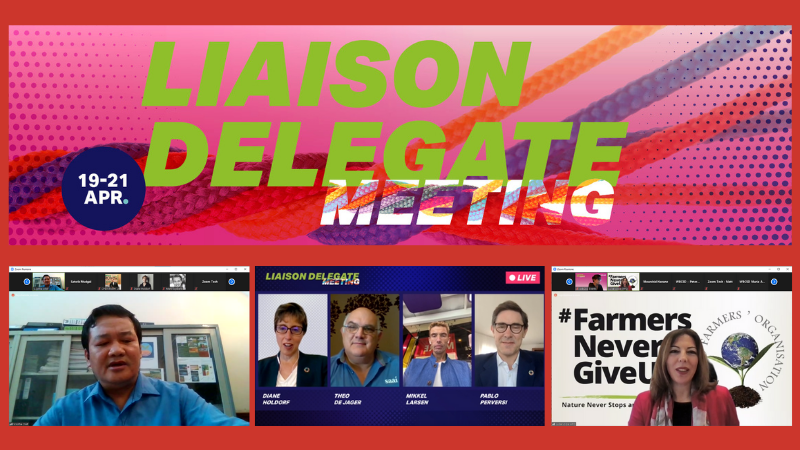From April 19 to 21, a delegation of the World Farmers’ Organisation (WFO) led by President Theo de Jager addressed the annual flagship event of the World Business Council for Sustainable Development (WBCSD) “Liaison Delegate Meeting”.
Getting involved in several panels and roundtables, the WFO delegation did not miss the opportunity to enhance the position of the farmers when it comes to working together on innovative business solutions to accelerate the transition to a sustainable world.
Here’s a round-up of the events and activities WFO has been involved in during the three-day event:
20 April
Nature-Positive agriculture: establishing a regenerative business mindset
This session aimed to stimulate conversations around key challenges and opportunities to move from business as usual to nature positive.
The WFO Asian Constituency Representative Sok Sotha, as a farmer and Vice-President of Cambodian Farmers Association – Federation of Agricultural Producers (CFAP), attended the session, enriching the debate with his experience from living and working on the land and with nature.
He highlighted what “nature-positive agriculture” mean at the farm level. “Farmers need access to knowledge in terms of soil management as well as to resources like water. We need to build farmers’ capacity, especially through farmers’ organisations, so to scale up their potential,” stated Sok Sotha about the role of Cambodian producers to move to nature-positive agriculture.
A business coalition for soils health investment
This session wanted to highlight how farmers can be best engaged within financial mechanisms to address soil health.
The WFO Head of Policy Development Luisa Volpe contributed to the discussion emphasizing, “If soil health depends on farmers, farmers’ health depends on the soil, as it is the real capital of their farm, and any farmer is committed to keeping their soils healthy. What they need are tools, education skills and innovation. Rewarding farmers for implementing practices that keep soils healthy and enhance carbon sequestration and increasing investments to scale up these practices are crucial factors.”
21 April
Plenary session: At the intersection of climate, nature, food and people
This session addressed the interconnections between climate, nature, food and people, highlighting how the 2021 key global events, such as the UN Food Systems Summit, CBD COP 15 and UNFCCC COP26, can be used to find holistic solutions. WFO President Theo de Jager joined the discussion bringing the farmers’ voice into the debate.
“Farming is a business. If it is not profitable, it is not sustainable. Positive policy environments are key to advance towards sustainable agriculture. If we empower farmers to achieve sustainability, we are already delivering on transforming food systems. In this process, farmers need to be at the table in shaping resilient food systems for the future. No one knows what can be done better than ourselves. No one knows what is feasible and sustainable on the farm better than we do. There is one entry point to all the challenges we are meant to face, from addressing climate change mitigation through sequestration to strengthening resilience, enhancing biodiversity, improving food security and nutrition, and improving the livelihood of farmers and rural communities: soil health. Healthy soils are the real capital of our farms and the first asset of sustainable and climate-resilient food systems. Agriculture is the solution to our challenges, and investing in agriculture is key to having a healthy planet for healthy people, ” declared WFO President, highlighting farmers’ critical considerations about food system transformation.
